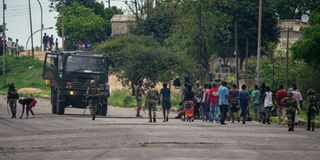
Zimbabwean soldiers allegedly make residents clean off barricades following recent protests in Sizinda township, Bulawayo, on January 16, 2019.
What you need to know:
The United Kingdom on Monday imposed a travel ban and asset freezes on four Zimbabwean security chiefs for alleged gross human rights violations.
UK's punitive measures are part of its independent set of sanctions against the country, outside a European Union (EU) embargo that has been in force for nearly two decades.
The UK's autonomous sanctions regime, that imposes travel bans and restricts the sale of military items, came into force on December 31, 2021.
The four Zimbabwe officials are National Security minister Owen Ncube; Isaac Moyo, Director General of the Central Intelligence Organisation; Godwin Matanga, Commissioner General of the Zimbabwe Republic Police; and Anselem Sanyatwe, Commander of the Presidential Guard and Tactical Commander of the National Reaction Force.
British Foreign Secretary Dominic Raab said the four were being punished for the killing of protesters by security forces in 2018 and 2019.
"Today we have issued new sanctions against four people responsible for the worst human rights violations in Zimbabwe in 2019, including the killing of 23 innocent people," Mr Raab said.
"The UK will hold to account those who engage in such appalling human rights abuses."
Accountability
The British government said the designations mean the four cannot freely travel to the UK, channel money through UK's banks "or profit from our economy".
"These targeted sanctions hold to account those responsible for the worst human rights violations against the people of Zimbabwe since President Emmerson Mnangagwa took power in 2017," the government said in a statement.
"This includes a State-sponsored crackdown against protests in January 2019 that resulted in the deaths of 17 Zimbabweans and post election violence in August 2018 in which six protestors lost their lives."
The sanctions mark yet another reversal in President Mnangagwa’s campaign for normalisation of relations between Zimbabwe and its former colonial power.
After the ouster of long-time ruler Robert Mugabe in a military coup in 2017, the new leader pledged to cooperate with London.
The re-engagement efforts, however, have been stalled by concerns over alleged human rights violations by President Mnangagwa’s government and doubts over its commitment to reforms.
The poor suffering
Zimbabwe says the sanctions are hurting the poor as the economy is being suffocated, but the UK insists that it only target errant leaders.
"UK sanctions are targeted measures," said James Duddridge, the UK minister for Africa.
"They don't target ordinary citizens nor are they intended to impact the wider economy of Zimbabwe. The UK is committed to tackling poverty and supporting genuine political and economic reform for the Zimbabwean people."
British ambassador to Zimbabwe, Melanie Robinson, said the UK will continue to push President Mnangagwa’s government to implement the reforms it promised over three years ago.
"The UK is on the side of the Zimbabwean people," Ambassador Robinson said. "We continue to press for genuine political and economic reforms and the protection of Zimbabweans' constitutional rights."
Western countries such as Australia, Canada, the United States and New Zealand, as well as the European Union, first imposed sanctions on Zimbabwe in 2002, citing alleged election fraud and human rights violations.
Zimbabwe claims it is being punished for seizing commercial farms from the minority farmers for redistribution to landless locals.


No comments:
Post a Comment